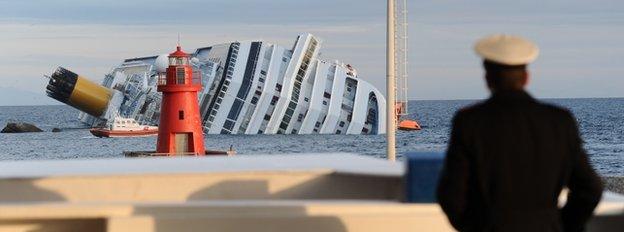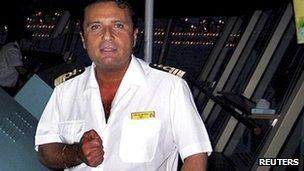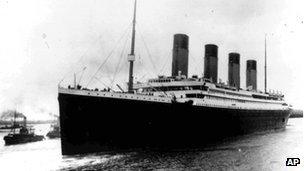Must a captain be the last one off a sinking ship?
- Published

The captain of the Costa Concordia, which crashed into rocks off the Italian coast and capsized, has been criticised for allegedly leaving the ship while passengers were still on board. Is a ship's captain legally required to be the last one off?
In the popular tradition of the sea, a ship's captain is expected to stay until all the passengers have been safely evacuated.
Fixed in the public imagination is Captain Edward Smith of the Titanic, who was last seen on or near the bridge of the ship as it went down.
In contrast, Captain Francesco Schettino is said to have left the Costa Concordia while many passengers were still struggling to reach safety.
A recording of a conversation between Captain Schettino and an Italian coastguard has been made public, in which the coastguard orders him back on to the ship to count the number of women and children remaining. The captain replies that he is co-ordinating the evacuation from a lifeboat.
Ultimate authority
Edward Phillips, principal lecturer in the department of law and criminology at the University of Greenwich, says a captain who fails in his duty in Italian waters could in theory be prosecuted under either international or national law.
Customary international law requires captains to operate under the principles of prudent seamanship, which means caring for the safety of crew and passengers, he says.
A captain's legal responsibilities are also set out in the Safety of Life at Sea (SOLAS) convention, which has been adopted by 161 of 170 member states, external of the International Maritime Organization, external. Italy is a member.
The first version of the treaty was passed in 1914, directly as a result of the sinking of the Titanic.
The current version, passed in 1974, does not specify that the captain should stay with his ship but states that the captain, or master, has the ultimate authority aboard his ship.
In addition, it says all passenger ships must have a system for emergency management, which would set out who is responsible for what during an emergency situation. This may or may not stipulate that the captain has to be the last to leave.

The Costa Concordia's captain is under house arrest
"It depends what was written on the plan," says a spokesman for the IMO.
The details of the Costa Concordia's emergency plan have not been made public. But Jans-Uwe Schroder-Hinrichs, the head of the maritime safety and environmental administration programme at the World Maritime University in Sweden and a former master mariner, says that it is understood within the industry that captain needs to stay on board to direct the evacuation.
"How would a captain fulfil his obligations if he was not on board? Emergency responses are nearly almost always co-ordinated from the ship - you have fairly limited options for getting necessary information from a lifeboat," he says.
There is also the question of Italian common law. In Italy, a captain who abandons his ship before it sinks, while passengers are still aboard, may faces charges for failing in their duty of care, Mr Phillips says.
Article 1097 of Italy's Maritime Law says that if the commander does not leave last, he risks two years in jail; if the vessel is lost, two to eight years; if the boat is used to carry people, three to 12 years.
Moral code
Accounts of captains leaving their sinking ships are extremely rare but not unique.
In 1991, Yiannis Avranas, the captain of a Greek cruise liner, was also strongly criticised after leaving the ship as it started to sink off the South African coast. He said he supervised the rescue effort from a helicopter. All 561 people aboard the Oceanos were eventually rescued.
In 2000, the captain of a Greek ferry, the Express Samina, which sank killing more than 60 people, was accused of failing to help passengers flee the sinking vessel.

The Titanic's captain went down with his ship
A court will ultimately decide whether the captain of the Costa Concordia broke the law by leaving the ship when he did, but he certainly seems to have acted contrary to many people's ideas of how a captain should behave.
Dr Laura Rowe, a historian at the University of Exeter who specialises in naval history, says the expectation that a ship's captain would stay on board until everyone has been evacuated developed in the mid-19th Century.
"At that point, the captain is expected to have a very close affinity with the ship itself. Captains are fully expected to be the last one off, if not to go down with the ship. They are known as the 'father of the ship'," she says.
This relationship was necessary to help enforce discipline, she says.
"The sea is a treacherous place and the crew have to have faith in the captain - if discipline is undermined or breaks down, then the ship becomes a less safe place, and more people risk being injured."
Take command
When is it acceptable for a captain to leave a sinking ship?
Had there been enough life rafts, the Titanic's Captain Smith may well have eventually abandoned his ship after all the passengers have been safely evacuated.
"As the ship's master, you are trained to take command, to do everything so that the number of fatalities are reduced to the minimum," says Mr Schroder-Hinrichs.
"That said, when the ship is sinking, you do try to rescue your own life, but it's hard to quantify when. As long as your own life is not at risk and there are passengers on board, there is a strong moral obligation to stay," he says.
"If the captain of the Costa Concordia really left at such an early stage, it is not what the industry would expect in a legal or moral sense."
As such, he says, it could prompt international regulators to re-assess the need for more precise rules.